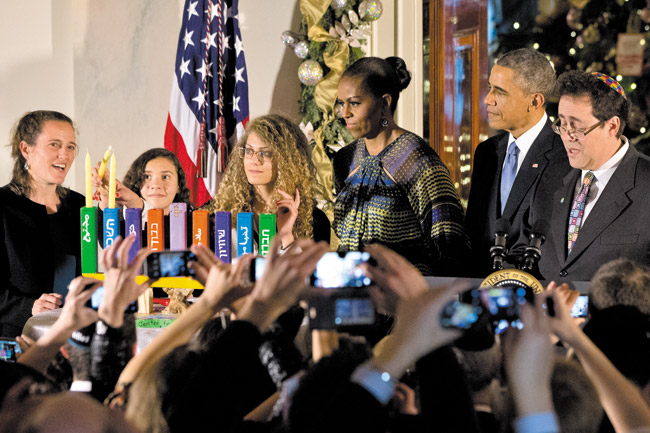Merry Christmas … Or Happy Holidays

Rebecca Bardach, with the Max Rayne Hand in Hand Bilingual School in Jerusalem (far left), watches as Inbar Vardi and Mouran Ibrahim, who are both students at the school, light candles for the second night of Hanukkah Dec. 17 with first lady Michelle Obama, President Barack Obama and Rabbi Bradley Shavit Artson, during the first of two Hanukkah receptions in the Grand Foyer of the White House. The two Israeli ninth-grade students, Vardi, who is Jewish, and Ibrahim, who is Muslim, lit the candles as the blessings were recited AP PHOTO/JACQUELYN MARTIN
I wonder what we’d have been like if America had not been founded by people espousing Christian values. What if, from the get-go, we had been a near-equal amalgam of Buddhists, Hindus, Muslims, Christians and atheists?
So many other nations struggle with their multi-religious populations.
We only had to struggle early on in Virginia and Maryland with Protestants, Catholics and Quakers. Our anti-Semitic period came much later.
You get heavy argument if you say America was founded as a Christian nation. The founders clearly wanted no established church, no theocracy. Our government was most hospitable to Christians, but tolerant of practitioners of other religions.
Religion scholar and law professor Geoffrey Stone writes that “deistic beliefs played a central role in the framing of the American republic” and that the “founding generation viewed religion, and particularly religion’s relation to government, through an Enlightenment lens that was deeply skeptical of orthodox Christianity.”
Others argue that not only did America have a Christian founding, but virtually all of the Founders were devout, orthodox Christians who consciously drew from their religious convictions to answer most political questions. They show us religious quotations from the Founders.
History scholar Mark David Hall, however, has written that “the rule seems to be that if a Founder uttered anything religious, at any time in his life, he counts as an orthodox or even evangelical Christian.”
I don’t see arguments on either side as having much heft today. Yes, we have the word God in some documents and court oaths and on our money. That might only be offensive to some militant atheists or agnostics. Generally, it’s ignored. Many of us simply drop that “under God” phrase in the Pledge of
Allegiance. No big deal. Nobody glares at you.
But it’s difficult to get away from Christianity at Christmastime, right? No Christ-Son-of-God, no Christmas. But notice we don’t do battle over Christmas versus Buddha Day, the Ramadan of Muslims or the Yamim Noraim of Jews. Those come and go with hardly any notice by the 77 percent of Americans who identify with the Christian faith.
We came to that because in 1776 all European-Americans, with the exception of about 2,500 Jews, identified as Christians. About 98 percent of the colonists were Protestants, and 1.9 percent Catholics.
Yes, the Puritans were Christians attempting to create “a shining city upon a hill” — a reference to Matthew 5:14. Yes, they separated church and state, but they thought the two should only cooperate to promote Christian values.
You should know that the word God does not appear anywhere in our Constitution or the amendments.
Yes, the 1787 signature reads: “Seventeenth Day of September in the Year of our Lord one thousand seven hundred and Eighty seven.” But that was just a customary way to end back then when you signed anything official. Why Eighty was capitalized I do not know.
The salutation was no more Christian than “yours truly.”
Whatever: Merry Christmas, or Happy Holidays, if you so prefer.
BanyanTreeHouse@gmail.com





